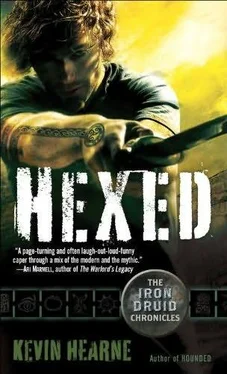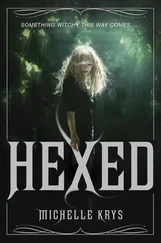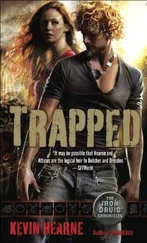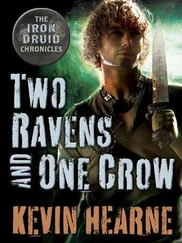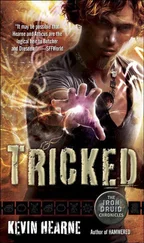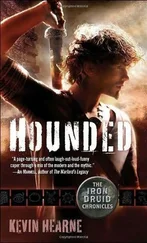Hexed
(The second book in the Iron Druid Chronicles series)
A novel by Kevin Hearne
For my father,
who never saw these books in print,
but at least left us knowing
his son had achieved his dream
Just as with the Irish words in Hounded , I wouldn’t want anyone to see the Polish, Russian, German, and Irish in Hexed and think to themselves, Do I really have to read that stuff properly? You don’t. I want you to enjoy yourself, and if you prefer saying words any old way you like, then I’m on your side. But if you’re the sort who’d like to hear precisely how things should sound coming out of the mouths of these characters, then I’ve provided the guide below to help you do that.
Names of the Polish Coven
Written Polish has a few letters that aren’t pronounced the way they are in English. Rather than try to explain them all, please take my very informal phonetic pronunciations here and trust me—unless you’d rather not.
Berta = Berta (this one’s just like it looks; I promise things will get interesting soon)
Bogumila = BO goo ME wah (However, her American nickname, Mila , would be pronounced ME lah, because otherwise Americans would constantly question why she pronounced her l like a w)
Kazimiera = KAH zhee ME rah
Klaudia = Klaudia (just like it looks)
Malina Sokolowski = Ma LEE nah SO ko WOV ski (that’s right, no l sound in her last name)
Radomila = RAH doe ME wah
Roksana = Roke SAH nah
Waclawa = Va SWAH va
Irish Phrases
Bean sidhe = BAN shee
Dóigh = doy (means burn )
Dún = doon (means close or shut )
Freagróidh tú = frag ROY too (means you will answer )
Múchaim = MOO hem (means extinguish )
Irish Doodads
Fragarach = FRAG ah rah (named sword: The Answerer)
Moralltach = MOR al tah (named sword: Great Fury)
The remaining phrases in Polish, Russian, and German can all be listened to online as sound files on my website, kevinhearne.com, if you feel like clicking on over there.
Irish God
Goibhniu = GUV new (member of the Tuatha Dé Danann; master smith and brewer of fine ales)
Turns out that when you kill a god, people want to talk to you. Paranormal insurance salesmen with special “godslayer” term life policies. Charlatans with “god-proof” armor and extraplanar safe houses for rent. But, most notably, other gods, who want to first congratulate you on your achievement, second warn you not to try such shenanigans on them, and finally suggest that you try to slay one of their rivals—purely as a shenanigan, of course.
Ever since word got around to the various pantheons that I had snuffed not one but two of the Tuatha Dé Danann—and sent the more powerful of the two to the Christian hell—I had been visited by various potentates, heralds, and ambassadors from most of the world’s belief systems. All of them wanted me to leave them alone but pick a fight with someone else, and if I successfully lanced the immortal boil that vexed them, I’d be rewarded beyond my wildest dreams, blah blah barf yak.
That reward business was a giant load of shite, as they’d say in the U.K. Brighid, Celtic goddess of poetry, fire, and the forge, had promised to reward me if I killed Aenghus Óg, but I hadn’t heard a word from her in the three weeks since Death carried him off to hell. I’d heard plenty from the rest of the world’s gods, but from my own? Nothing but the chirping of crickets.
The Japanese wanted me to mess with the Chinese, and vice versa. The old Russian gods wanted me to stick it to the Hungarians. The Greeks wanted me to knock off their Roman copycats in a bizarre manifestation of self-loathing and internecine jealousy. The weirdest by far were those Easter Island guys, who wanted me to mess around with some rotting totem poles in the Seattle area. But everyone—at least, it sure seemed like everyone—wanted me to slay Thor as soon as I had a free moment. The whole world was tired of his shenanigans, I guess.
Foremost among these was my own attorney, Leif Helgarson. He was an old Icelandic vampire who had presumably worshipped Thor at some point in ancient history, but he’d never told me why he now harbored such hatred for him. Leif did some legal work for me, sparred with me regularly to keep my sword arm sharp, and occasionally drank a goblet full of my blood by way of payment.
I found him waiting for me on my porch the night after Samhain. It was a cool evening in Tempe, and I was in a good mood after having much to give thanks for. While the American children had busied themselves the night before by trick-or-treating on Halloween, I had paid plenty of attention to the Morrigan and Brighid in my own private ceremonies, and I was thrilled to have an apprentice to teach and to share the night with. Granuaile had returned from North Carolina in time for Samhain, and though the two of us were not much of a Druid’s grove, it was still a better holy night than I had enjoyed in centuries. I was the only real Druid left, and the idea of starting a new grove after such a long time of going it alone had filled me with hope. So when Leif greeted me formally from my front porch as I came home from work, I was perhaps more exuberant in my response than I should have been.
“Leif, you spooky bastard, how the hell are ya?” I grinned widely as I braked my bike to a stop. He raised his eyebrows and peered at me down his long Nordic nose, and I realized that he was probably unused to such cavalier address.
“I am not a bastard,” he replied archly. “Spooky I will grant you. And while I am well”—a corner of his mouth quirked upward a fraction—“I confess not so jocund as yourself.”
“Jocund?” I raised my brows. Leif had asked me in the past to call him on behaviors that broadcast how much older he was than he looked.
Apparently he didn’t want to be corrected right then. He exhaled noisily to express his exasperation. I thought it amusing that he employed that, since he had no need to breathe. “Fine,” he said. “Not so jovial, then.”
“No one uses those words anymore, Leif, except for old farts like us.” I leaned my bike against the porch rails and mounted the three steps to take a seat next to him. “You really should spend some decent time learning how to blend in. Make it a project. Popular culture is mutating at a much faster rate these days. It’s not like the Middle Ages, when you had the Church and the aristocracy keeping everything nice and stagnant.”
“Very well, since you are the verbal acrobat who walks the tightrope of the zeitgeist, educate me. How should I have responded?”
“First, get rid of ‘well.’ Nobody uses that anymore either. Now they always say, ‘I’m good.’ ”
Leif frowned. “But that is grammatically improper.”
“These people don’t care about proper. You can tell them they’re trying to use an adjective as an adverb and they’ll just stare at you like you’re a toad.”
“Their educational system has suffered serious setbacks, I see.”
“Tell me about it. So what you should have said was, ‘I’m not stoked like you, Atticus, but I’m chill.’ ”
“I’m ‘chill’? That means I am well—or good, as you say?”
“Correct.”
“But that’s nonsense!” Leif protested.
“It’s modern vernacular.” I shrugged. “Date yourself if you want, but if you keep using nineteenth-century diction, people will start to think you’re a spooky bastard.”
“They already think that.”
Читать дальше
